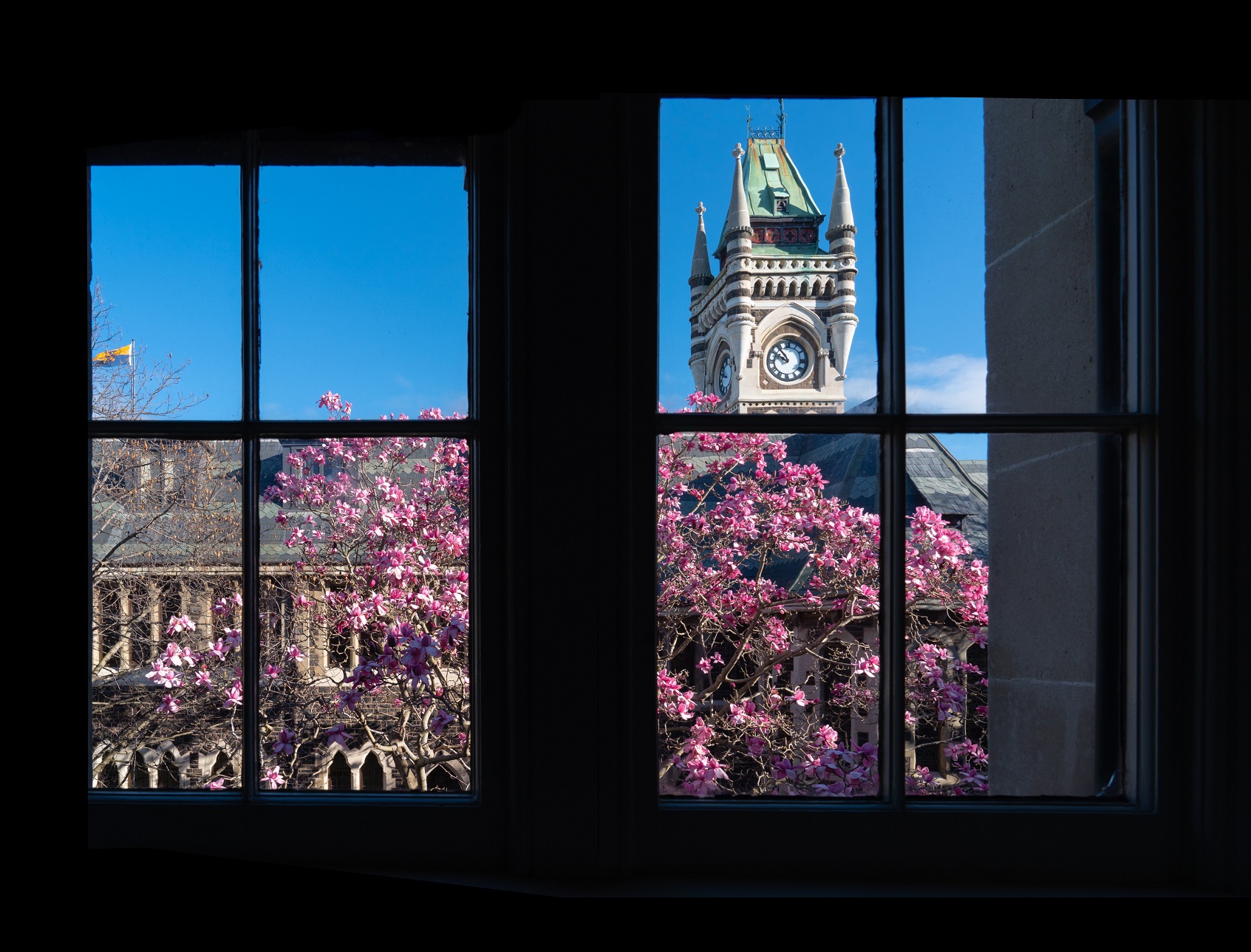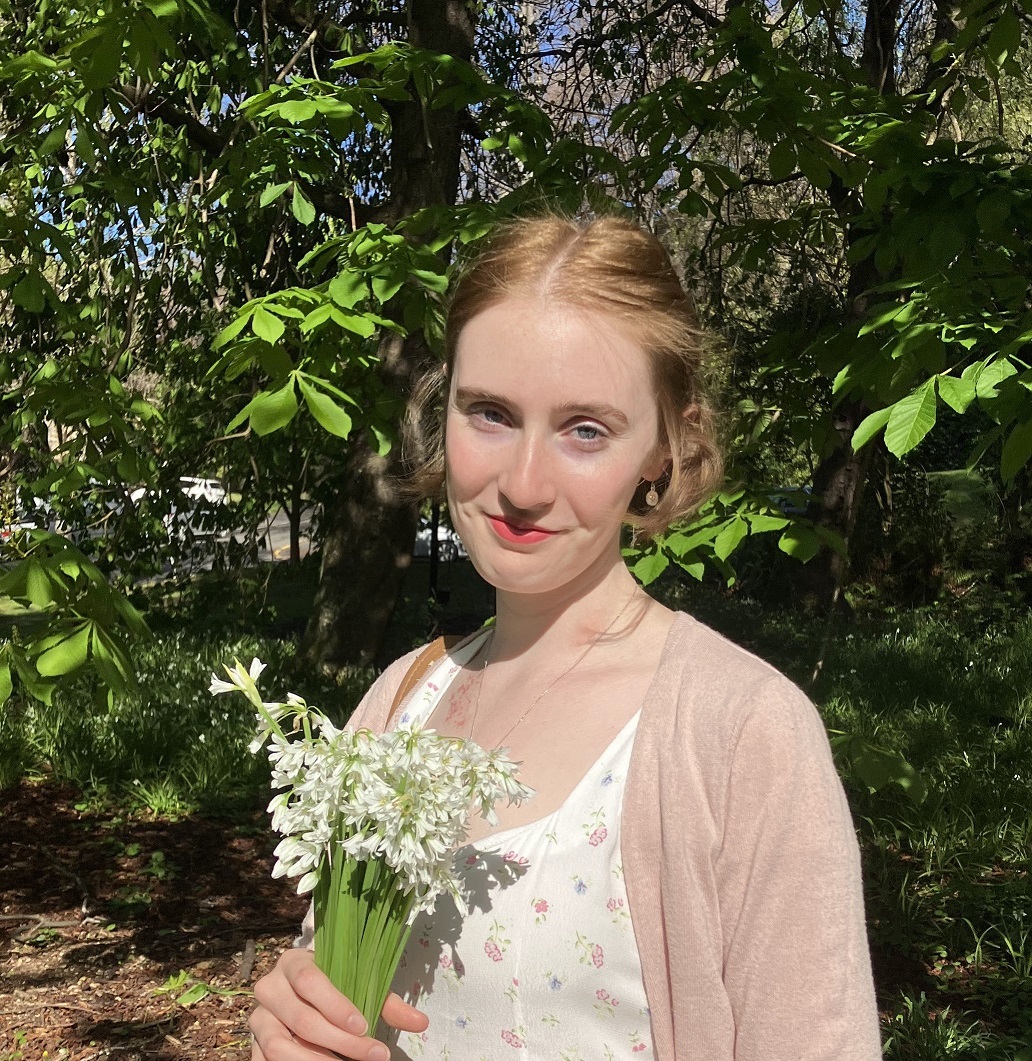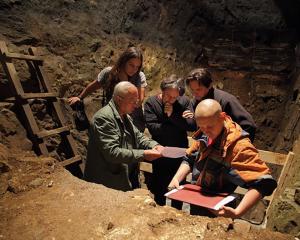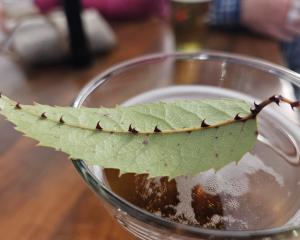
From this upper window, I am level with it — its riotous colour, like a crowd of painted faces stretching far away from the eye, rippling with small human movements. Even in full flower, there is something wintery about it. The branches still have the dry sparseness of crumpled bone, and each individual flower is anthropomorphically globular, like the back of a bald man’s head as he looks up and his skin wrinkles into folds.
I press my hand against the window half-cupped, and from this distance my hand is large enough and the tree small enough to disappear entirely beneath. By the time I lift my hand, a small cluster of blossoms has been cast into the air by a distant tree. They gossip past like a cloud of crystalline perfume. Behind them, migratory patterns of students move in flocks. I check my watch. Ten to three. Like clockwork.
I turn and walk slowly down the corridor, pulling my cardigan tighter around myself and pinning it in place with crossed arms. The sunlit windows I pass by are like the yellow glowing slits of a zoetrope. From the end of the corridor, I can hear the light, cheerful noises of workplace domesticity — the zip boiler tap gurgling a small deadly waterfall into chipped mugs; the dry rustle of teabags from the jar; the ebb and flow of read-out quiz questions and answers.
"Here’s a topical one! How old are magnolia trees? I suppose a few million years?"
I round the corner and give a small wave. Someone has emptied the dishwasher already, and the mugs sit warm and clean in the lower cupboard. I scan them until I find one of the three that I like, then set about making myself some tea.
"They must be old enough to have made it around the world — so yeah, definitely a few million. Probably more. Twelve?"
"Ninety five, I think."
My colleague turns to face me with a half-smile. "Are you sure?"
I drop my used teabag in the bin where it lands with the same fleshy slap as a fallen petal. "Pretty sure. They evolved before there were bees."
"Damn. Alright, Ill give it a go — thanks for that." He bends studiously back to his quiz and I swipe a biscuit as I inch past him.
It’s three in the afternoon. The corridor is a dancehall for dust motes. The gold sun drenches dark-polished wood, and in the cooling shade of the quad, another flower begins unfurling.
There are so many opportunities and chances I have let slip through my fingers like sand. So many countries I never went to; languages I never learned. So many interesting or kind or dangerous people I never went home with. So I am too old now and too afraid of the nothing that life offers up to me that I do this thing with half-closed eyes.
I used to do it every few months. Then every few weeks. Now it’s hard to go a few days without. Now that it’s so light in the evenings — now that campus has entered its week-long mid-semester hibernation — it has become too easy to do this every night.
I wait until they’re all gone. Some linger, and as I wait for them to leave, my fingers twist the cuff of my cardigan until it hangs loose and baggy in fingertip-shaped swags. Then it is just me. Just me and ...
I make my way out into the cool of the quad. Just me and my opportunity. Just me and the chance I didn’t miss.
I make my way up to the magnolia in steps so slow that I almost overbalance. Anticipation. Wheting. I place my hand flat on its wooden bench — feel the spikes of splinters and the cool undulations of moss under my skin. There is a petal just to the right of my fingers. I let them inch over to it, almost as though I am not culpable for my own movements.
I pick up the petal and lift it to my lips, pressing its thick-veined flatness to my skin. The tip of it is a bruised taupe colour. When I put it in my mouth — folding it slightly to accommodate its cupped width — the bruised part tastes slightly over-sweet, like the water of flowers left in a vase too long.
This is the opportunity I wait for — this is what keeps me holding my breath through each day. The moment I bite through the petal’s flesh and let its sour, perfume-y taste bleed out, vivid images unfold in front of me like an impossible cinemascope screen. I bend slightly at the waist, gripping the wood of the bench, and the sudden cool breeze feels impossibly textural, as though I can count each molecule of air that moves in rivulets over my bare skin.
I can never predict what it will show me. The first time it was magnolia trees, and I saw through beetle eyes 95 million years ago — I saw mandibles at eye-height; I saw bracts and tepals; the morphology of each flower up close. I saw its near-extinction events; its roots and coils and numbers dotted over the earth like forever-stationery soldiers.
But today it wants to show me volcanoes. I am magma rushing hotter than blood under the Earth. I am smooth skins of metal cooling even under the blazing sun; I am the pulse-rush of anger after the slip of a tectonic plate. I am skeins of brightness running in deadly veins down a mountainside.
I swallow the last of the petal and the bark of the magnolia turns back into dry greyness. I hoist my handbag over my shoulder, breathe a dry mouthful of air, and walk into the night.
The next day I take my sandwich out to the garden next to Marama Hall and sit on the sunniest bench. From here, if I squint against the starkness of the light, I can see the tip of the magnolia tree rising above the hedge like a distant lilac mountain.
If age is wisdom, and if the tree is giving me what it knows, then I should be wise enough to stop. Ninety five million years of knowing when to stop.
I stretch out my legs and hook one arm over the back of the bench, then kick my shoes off and feel the clean rubbery texture of the grass under my feet. I have been the eyes of a beetle, looking out from a magnolia tree millions of years ago, an unfamiliar cretaceous landscape stretching out in front of me, tectonic and bare. I have been the favourite tree of emperors and queens; I have been the first sign of spring at the end of cold, bitter winters. But always at the end I come back to me — an inoffensive admin in a baggy cardigan; a someone who isn't quite no-one, but who barely exists in memory and will exist even less when I am gone. The trees memories should be teaching me something but I am too young and too human to learn. I take a bite of my sandwich and chew it slowly, wishing it were a petal.

The skin of my wrist is paper-white. The white is veined with purple and a faint pink blush colours up from my fingertips.
I let out an involuntary noise of surprise and drop my hand, closing my eyes. In the safer semi-darkness, I use my left hand to touch the skin of my right. Cool. Fleshy. Petal-texture.
I open my eyes again and nothing has changed. The death-grip inside tightens. I clap the palm of my left hand across my eyes but in the darkness I see magma again, lighting up with a heady phosphorescence.
I stand suddenly and make my way towards the green-patina doors, stumbling and gripping the wall with my petal-flesh hand. The sensation is cold and strangely empty, so I put out my other hand instead, but from its palm the yellow fronds of stamen bend uselessly.
I break out into clean, sterile daylight and stumble towards the magnolia tree. With my stamen hand hanging uselessly by my side, I use the other to pick up a petal and shove it into my mouth.
An image of myself. Myself learning another language and moving across the planet. Myself in a uniform; myself in the arms of a lover I barely recognise.
I pick up another petal. Swallow it whole.
Me sitting silently on a quiet porch; me stroking the head of a small child. Me raising a hand towards the marble statue of a woman, her fingers transubstantiating into leaves.
I eat another. Another. A zoetrope of all the choices I didn’t make. A knowledge-feast of everything I never did.
My colleagues stand clustered in the doorway to our building. I should turn and look and them but I can’t move. My skin is dry and cracked and the soil feels cool and gentle around my feet. A single petal drops from my arm.
Writer 2023 competition
Other winners were
- Student poetry: Kim Cope Tait
(Runner up: Kathy Nam)
- Student fiction: Sydney Rodriguez
(Runner up: Judah Song)
- Staff poetry: Mandy Phipps-Green
(Runner up: Melissa Audeau)
- Staff fiction: Molly Crighton
(Runner up: David Jenkins)
- Alumni poetry: Val O'Reilly
(Runner up: Charissa Murphy)
- Alumni fiction: Caellin (Monti) Rodgers
(Runners up: Anne Lim and Feby Idrus)











